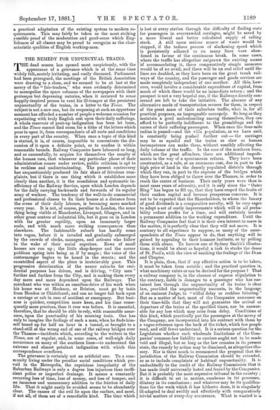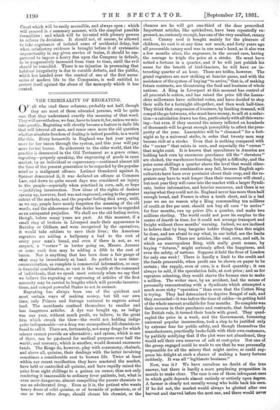THE REMEDY FOR UNPUNCTUAL TRAINS.
THE dead season has opened most auspiciously, with the appearance of a grievance which is at the same time widely felt, acutely irritating, and easily discussed. Parliament had been prorogued, the meetings of the British Association were drawing to a close, and we seemed to be at last at the mercy of the "fair-traders," who were evidently determined to monopolise the spare columns of the newspapers with their grotesque but depressing outcries, when it occurred to some happily-inspired person to vent his ill-temper at the persistent unpunctuality of the trains, in a letter to the Times. The subject is not a new one, but its reopening at such an opportune moment has afforded a number of people a welcome occasion for expatiating with truly English zest upon their daily sufferings. A whole reservoir of pent-up indignation has been let loose, and the Times cannot find room for a tithe of the letters which pour in upon it, from correspondents of all sorts and conditions in every part of the country. When once a topic of this kind is started, it is, of course, impossible to concentrate the dis- cussion of it upon a definite point, or to confine it within reasonable bounds. Railway Companies have laboured so long, and so successfully, to acquire for themselves the enmity of the human race, that whenever any particular phase of their administration comes under review, public criticism is apt to be reckless and undiscriminating. The present controversy has unquestionably produced its fair share of frivolous com- plaints, but if there is one thing which it establishes more clearly than another, it is the scandalous and systematic in- efficiency of the Railway Service, upon which London depends for the daily carrying backwards and forwards of its regular army of workers. The tendency of the well-to-do commercial and professional classes to fix their homes at a distance from the scene of their daily labours, is becoming more marked every year. It is not, of course, peculiar to London, the same thing being visible at Manchester, Liverpool, Glasgow' and in other great centres of industrial life, but it goes on in London with far greater rapidity, upon an immensely larger scale and with much more striking consequences than elsewhere. The fashionable suburb has hardly come into vogue, before it is invaded and gradually submerged by the crowds of clerks, managers, and artisans who follow in the wake of their social superiors. Rows of small houses are run up ; the little shop-keeper and the corner publican spring into being as. if by magic ; the voice of the costermonger begins to be heard in the streets ; and the countrified aspect of the place is irretrievably gone. This progressive deterioration of the nearer suburbs for resi- dential purposes has driven, and is driving, "City men" further and further from the City, and is making them every day more and more dependent upon the Railways. The merchant who was within an omnibus-drive of his work when his home was at Hackney, or Brixton, must go by train from Hendon or Chislehurst, and can no longer fall back upon a carriage or cab in case of accident or emergency. But busi- ness is quicker, competition more keen, and his time conse- quently more precious, than it ever was before. It is essential, therefore, that he should be able to rely, with reasonable assur- ance, upon the punctuality of his morning train. One has only to imagine the feelings of such a man, when he finds him- self boxed up for half an hour in a tunnel, or brought to a stand-still at the wrong end of one of the railway bridges over the Thames—incidents which, according to the writers in the Times, are of regular, and, in some cases, of well-nigh daily occurrence on many of the southern lines—to understand the extreme and almost petulant indignation with which this correspondence overflows.
The grievance is certainly not an artificial one. To a com- munity living under the peculiar social conditions which pre- vail in the Metropolis, the capricious irregularity of the Suburban Railways is only a degree leas injurious than ineffi- cient police or imperfect drainage. It means a constantly recurring loss of time, loss of money, and loss of temper, and an immense and unnecessary addition to the friction of daily life. That it might easily be avoided seems to be abundantly clear. The causes of the evil lie upon the surface, and most, if not all, of them are of a remediable kind. The time which is lost at every station through the difficulty of finding seats- for passengers in overcrowded carriages, might be saved by a more liberal and better calculated supply of rolling stock. A still more serious source of waste would be stopped, if the tedious process of slackening speed which is persistently adhered to on many lines were aban- doned in favour of the continuous break. In some cases, where the traffic has altogether outgrown the existing means of accommodating it, these comparatively simple measures ;would be of no avail, and there will be no real relief until the lines are doubled, as they have been on the great trunk rail- ways of the country, and the passenger and goods services are completely independent of one another. All this, how- ever, would involve a considerable expenditure of capital, from much of which there would be no immediate return ; and the prospect is not a very hopeful one, if the Railways directly con- cerned are left to take the initiative. The absence of any alternative mode of transportation secures for them, in respect of the great mass of their suburban traffic, what is, for all practical purposes, an impregnable monopoly. So long as they maintain a good understanding among themselves, they can. afford to be perfectly indifferent to the grumblings and the- curses of their suffering passengers. When once the four-mile radius is passed—and the villa population, as we have said, is constantly being pushed further out — the carriages may be as squalid and the trains as slow as human incompetence can make them, without sensibly affecting the daily volume of the traffic. In the case of the southern lines, which are the great offenders, there are additional impedi- ments in the way of a spontaneous reform. They have been constructed, as a rule, at an enormous cost, due in part to the high price of land in the densely populated districts through which they run, in part to the expense of the bridges which they have been obliged to throw over the Thames, in order to reach the centre of business. Their early years were thus in- most cases years of adversity, and it is only since the "Outer Ring" has begun to fill up, that they have reaped the fruits of their sunken capital and become prosperous concerns. It is not to be expected that the Shareholders, to whom the luxury of good dividends is a comparative novelty, will be very eager to adopt a set of costly improvements which will in all proba- bility reduce profits for a time, and will certainly involve a permanent addition to the working expenditure. Until the Railway Companies feel that it is their own interest to move in the matter, it is perfectly clear that they will not move. It is contrary to all experience to suppose, as many of the corre- spondents of the Times appear to do, that anything will be, gained by appealing to their humane instincts, or by pelting them with abuse. To borrow one of Sydney Smith's illustra- tions, it would be about as hopeful a task to stroke the dome of St. Paul's, with the view of soothing the feelings of the Dean and Chapter. It is plain then, that if any effective action is to be taken, it must be alien from outside ; and the practical question is what machinery exists or can be devised for the purpose ? That a railway company is, in the absence of express stipulation to the contrary, liable in damages to a passenger who has sus- tained loss through the unpunctuality of its trains is clear law, provided the unpunctuality amounts, in the language of an eminent Judge, to "wilful delay or reckless loitering." But as a matter of fact, most of the Companies announce on their time-bills that they will not guarantee the arrival or departure of the trains at the specified times, nor be answer- able for any loss which may arise from delay. Conditions of this kind, which practically put the passengers at the mercy of the Company, are incorporated into his contract with them by a vague reference upon the back of the ticket, which few people- read, and still fewer understand. It is a serious question for the- Legislature whether such wholesale limitations of the Com- panies' common-law liability as carriers ought not to be made void and illegal, but so long as the law remains in its present state, the remedy by action may be dismissed, as altogether illu- sory. Nor is there much to recommend the proposal that the- jurisdiction of the Railway Commission should be extended, so as to include complaints of habitual unpunctuality. It in undoubtedly to the credit of the Railway Commission that it.
has made itself universally hated and feared by the Companies. But it is probably the most expensive tribunal in the country ;
it is difficult to set in motion, cumbrous in it processes, dilatory in its conclusions ; and whatever may be its qualifica- tions for the work which it has hitherto done, it is singularly ill-adapted to deal swiftly and effectively with comparatively trivial matters of every-day occurrence. What is wanted is a
Court which will be easily accessible, and always open ; which will proceed in a summary manner, with the simplest possible formalities ; and which will be invested with plenary powers to enforce its decisions. It should not, of course, be allowed to take cognisance of isolated cases of accidental delay, but when satisfactory evidence is brought before it of systematic unpunctuality in any given service of trains, it should be em- powered to impose a heavy fine upon the Company in default, to be progressively increased from time to time, until the evil should be remedied. There is no injustice in presuming that habitual irregularity is due to curable defects, and the public, which has handed over the control of one of the first neces- saries of modem life to the Companies, is well entitled to protect itself against the abuse of the monopoly which it has created.































 Previous page
Previous page